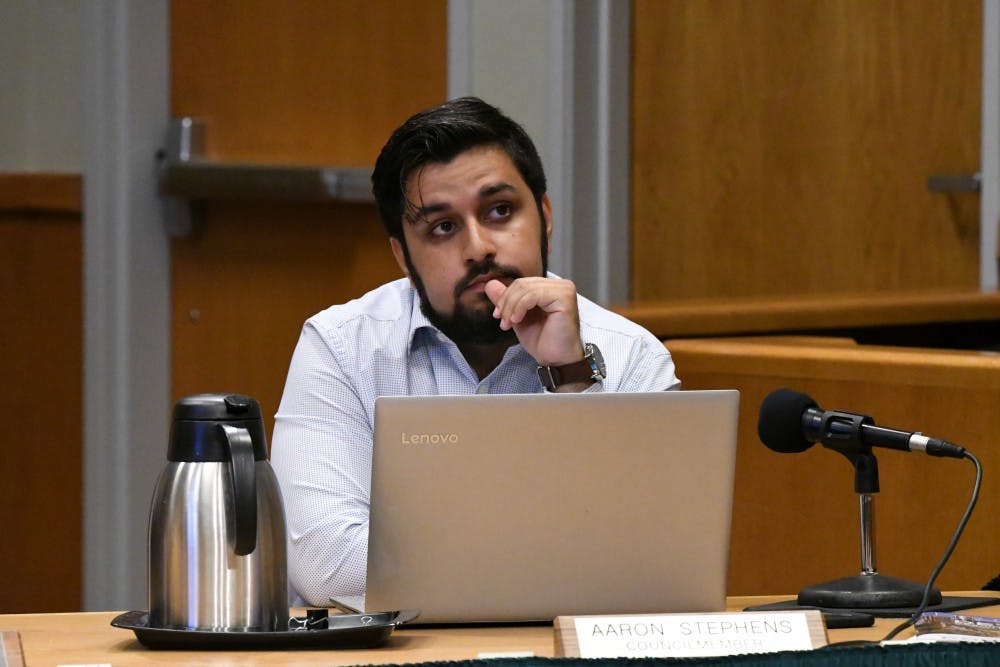Just a 20-year-old student at Michigan State University when he announced his campaign for East Lansing City Council and 23 years old when he was appointed mayor pro tem, Mayor Aaron Stephens has always wanted to do good for his community.
When the July 14 City Council meeting saw the resignation of former Mayor Ruth Beier and Council Member Mark Meadows, Stephens found himself 24 years old and mayor of East Lansing, navigating a national pandemic with COVID-19, police and public safety reform and a resulting budget crisis.
Stephens ran for City Council as a student, hoping to give a voice to young people and serve his community.
“I obviously did not expect to be in the position that I am right now. I didn’t even expect to be mayor pro tem,” Stephens said. “Being mayor pro tem was a really big honor in itself because that showed my fellow council members had some faith in me to be a leader on the council already, which was really, honestly, very, very humbling for me — and I was proud of that.”
While becoming mayor at this age was not necessarily part of the plan, Stephens said it offers him a much-needed perspective with his connections to the young people in the community, many of whom have a lot of the same thoughts and perspectives as he does. The hope, he said, is to be able to somewhat bridge the gap between the government structure in East Lansing and the people they are supposed to serve.
“I actually remember very specifically, it didn’t hit me that I had actually become mayor until probably a week, maybe two, after it happened," Stephens said. "And I did just have somewhat of a crystallizing moment while I was driving down U.S.-127 where I thought to myself ‘holy heck I’m actually mayor.'" But it was mostly because the work didn’t just stop and I didn’t sign up for a job to be someone that served in office and kept things the way they were. I signed up because I wanted to change this community for the better, and I wanted to serve in the best capacity that I could and that means you have really tough conversations. You come up with creative solutions to things, and you become a leader, not only for your community, but you try to lead the city in a great direction so that other communities can follow your example."
On Aug. 1, City Council unanimously appointed Dana Watson and Ron Bacon to fill the two seats left vacant by Beier and Meadows, making history creating the first council with people of color in the majority.
Stephens, previously the only standing council member of color, said the process of selecting two applicants to serve was both long and hard, but the gravity of it all hit him after the meeting ended.
“I cried that night, I’m going to be honest," Stephens said. “I sat in my office and I understood that I got elected and I was the only person of color on the council. We have a global movement to represent BIPOC people and lift up voices of underrepresented folks, and in East Lansing, we made history.”
That night, Stephens recalled a moment sitting on the couch watching Netflix with his significant other when she looked over at him and asked, “what do normal people do after they make history?”
“I really didn’t know what to say to it because I don’t know,” Stephens said. “I really didn’t know how to react. I think it was an extremely proud moment for myself, but I think it’s also an incredibly proud moment for this community, and I’m just happy I had a little hand in it.”
Moving forward with council, Stephens said his goal is to put East Lansing on a trajectory for being truly sustainable, financially stable and equitable. The goal might not necessarily be to get all of the work done, but rather to get a new perspective and to shift priorities in the right direction toward change.
At the July 14 meeting, as he became mayor, Stephens said he did not intend to run for reelection. He would love to see another young person run for office, citing they had a lot of incredible candidates that were a part of their interview process who would do great to move the city in the right direction.
“I think it’s important for leaders to know when it’s time to step aside and when it’s time to let the next generation of people come take the reins," Stephens said. "I know I say that as I’m 24, but I do think it’s important to make sure that public service for leaders is about public service. … I had a lot of people tell me that I shouldn’t run for office when I did. I was 20 years old when I announced my campaign. I had a lot of people tell me that I couldn’t win. I had a lot of people tell me that it wasn’t time, that I needed to wait my turn. And I think that that kind message is — it’s just a faulty message. Because it’s always the time for change, and it's always the time to step up and serve your community.”
This article is part of our Welcome Week print edition. Read the full issue here.
Support student media!
Please consider donating to The State News and help fund the future of journalism.
Discussion
Share and discuss “Mayor Aaron Stephens reflects on his journey to mayor, his position on a historic council” on social media.








